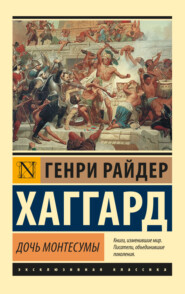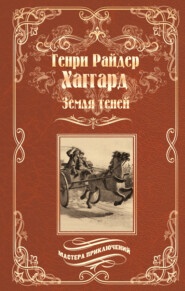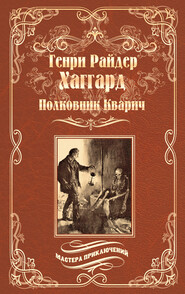По всем вопросам обращайтесь на: info@litportal.ru
(©) 2003-2024.
✖
Joan Haste
Настройки чтения
Размер шрифта
Высота строк
Поля
“Good day, Joan Haste,” she said kindly: “I understand that you were with my son at the time of this shocking accident. Will you tell us how it came about?”
“Oh, my Lady,” answered Joan with agitation, “it was all my fault – at least, in a way it was, though I am sure I never meant that he should be so foolish as to try and climb the tower.” And in a simple straightforward fashion she went on to relate what had occurred, saying as little as possible, however, about her own share in the adventure.
“Thank you,” said Lady Graves when Joan had finished. “You seem to have behaved very bravely, and I fear that you are a good deal hurt. I hope you will soon be well again. And now, Dr. Childs, do you think that I might see Henry for a little?”
“Well, perhaps for a minute or two, if you will keep as quiet as possible,” he answered, and led the way to the sick room.
By this time the effects of the sleeping draughts had passed off, and when his mother entered Henry was wide awake and talking to Mrs. Gillingwater. He knew her step at once, and addressed her in a cheery voice, trying to conceal the pain which racked him.
“How do you do, mother?” he said. “You find me in a queer way, but better off than ever I expected to be again when I was hanging against the face of that tower. It is very good of you to come to see me, and I hope that the news of my mishap has not upset my father.”
“My poor boy,” said Lady Graves, bending over him and kissing him, “I am afraid that you must suffer a great deal of pain.”
“Nothing to speak of,” he answered, “but I am pretty well smashed up, and expect that I shall be on my back here for some weeks. Queer old place, isn’t it? This good lady tells me that it is her niece’s room. It’s a very jolly one, anyhow. Just look at the oak panelling and that old mantelpiece. By the way, I hope that Miss Joan – I think that she said her name was Joan – is not much hurt. She is a brave girl, I can tell you, mother. Had it not been that she caught me when I fell, I must have gone face first on to that spiked tomb, and then – ”
“Had it not been for her you would never have climbed the tower,” answered Lady Graves with a shudder. “I can’t think what induced you to be so foolish, at your age, my dear boy.”
“I think it was because she is so pretty, and I wanted to oblige her,” he answered, with the candour of a mind excited by suffering. “I say, I hope that somebody has written to the Levingers, or they will be wondering what on earth has become of me.”
“Yes, yes, dear; they are here, and everything has been explained to them.”
“Oh, indeed. Make them my excuses, will you? When I am a bit better I should like to see them, but I don’t feel quite up to it just now.”
Henry made this last remark in a weaker voice; and, taking the hint, Dr. Childs touched Lady Graves on the shoulder and nodded towards the door.
“Well, dear, I must be going,” said his mother; “but Ellen or I will come over to-morrow to see how you are getting on. By the way, should you like us to send for a trained nurse to look after you?”
“Most certainly not,” Henry answered, with vigour; “I hate the sight of hospital nurses – they always remind me of Haslar, where I was laid up with jaundice. There are two doctors, and this good lady taking care of me here, and if that isn’t enough for me, nothing will be.”
“Well, dear, we will see how you get on,” said his mother doubtfully. Then she kissed him and went; but the doctor stopped behind, and having taken his patient’s temperature, ordered him another sleeping draught.
So soon as Lady Graves had left the parlour, Joan followed her example, murmuring with truth that she felt a little faint.
“What a beautiful girl, father!” said Emma to Mr. Levinger. “Who is she? Somebody said the other day that there was a mystery about her.”
“How on earth should I know?” he answered. “She is Mrs. Gillingwater’s niece and I believe that her parents are dead; that is the only mystery I ever heard.”
“I think that there must be something odd, all the same,” said Emma. “If you notice, her manners are quite different from those of most village girls, and she speaks almost like a lady.”
“Been educated above her station in life, I fancy,” her father answered snappishly. “That is the way girls of this kind are ruined, and taught to believe that nothing in their own surroundings is good enough for them. Anyhow, she has led poor Graves into this mess, for which I shall not forgive her in a hurry.”
“At least she did her best to save him, and at great risk to herself,” said Emma gently. “I don’t see what more she could have done.”
“That’s woman’s logic all over,” replied the father. “First get a man who is worth two of you into some terrible scrape, physical or otherwise, and then do your ‘best to save him,’ and pose as a heroine. It would be kinder to leave him alone altogether in nine cases out of ten, only then it is impossible to play the guardian angel, as every woman loves to do. Just to gratify her whim – for that is the plain English of it – this girl sends poor Graves up that tower; and because, when he falls off it, she tries to throw her arms round him, everybody talks of her wonderful courage. Bother her and her courage! The net result is that he will never be the same man again.”
Her father spoke with so much suppressed energy that Emma looked at him in astonishment, for of late years, at any rate, he had been accustomed to act calmly and to speak temperately.
“Is Captain Graves’s case so serious?”
“From what young Salter tells me I gather that it is about as bad as it can be of its kind. He has fractured his leg in a very awkward place, there is some hæmorrhage, and he lay exposed for nearly five hours, and had to be carried several miles.”
“What will happen to him, then?” asked Emma in alarm. “I thought that the worst of it was over.”
“I can’t tell you. It depends on Providence and his constitution; but what seems likely is that they will be forced to amputate his leg and make him a hopeless cripple for life.”
“Oh!” said Emma, catching her breath like one in pain; “I had no idea that it was so bad. This is terrible.” And for a moment she leant on the back of a chair to support herself.
“Yes, it is black enough; but we cannot help by stopping here, so we may as well drive home. I will send to inquire for him this evening.”
So they went, and never had Emma a more unhappy drive. She was looking forward so much to Captain Graves’s visit, and now he lay wounded – dangerously ill. The thought wrung her heart, and she could almost find it in her gentle breast to detest the girl who, however innocently, had been the cause of all the trouble.
Chapter 10
Azrael’s Wing
For the next two days, notwithstanding the serious condition of his broken leg, Henry seemed to go on well, till even his mother and Emma Levinger, both of whom were kept accurately informed of his state, ceased to feel any particular alarm about him. On the second day Mrs. Gillingwater, being called away to attend to some other matter, sent for Joan – who, although her arm was still in a sling, had now almost recovered – to watch in the sick room during her absence. She came and took her seat by the bed, for at the time Henry was asleep. Shortly afterwards he awoke and saw her.
“Is that you, Miss Haste?” he said. “I did not know that you cared for nursing.”
“Yes, sir,” answered Joan. “My aunt was obliged to go out for a little while, and, as you are doing so nicely, she said that she thought I might be trusted to look after you till she came back.”
“It is very kind of you, I am sure,” said Henry. “Sick rooms are not pleasant places. Perhaps you wouldn’t mind giving me some of that horrid stuff – barley-water I think it is. I am thirsty.”
Joan handed him the glass and supported his head while he drank. When he had satisfied his thirst he said:
“I have never thanked you yet for your bravery. I do thank you sincerely, Miss Haste, for if I had fallen on to those spikes there would have been an end of me. I saw them as I was hanging, and thought that my hour had come.”
“And yet he told me to ‘stand clear’!” reflected Joan; but aloud she said:
“Oh! pray, pray don’t thank me, sir. It is all my fault that you have met with this dreadful accident, and it breaks my heart to think of it.” And as she spoke a great tear ran down her beautiful face.
“Come, please don’t cry: it upsets me; if the smash was anybody’s fault, it was my own. I ought to have known better.”
“I will try not, sir,” answered Joan, in a choking voice; “but aunt said that you weren’t to talk, and you are talking a great deal.”
“All right,” he replied: “you stop crying and I’ll stop talking.”
As may be guessed after this beginning, from that hour till the end of his long and dangerous illness, Joan was Henry’s most constant attendant. Her aunt did the rougher work of the sick room, indeed, but for everything else he depended upon her; clinging to her with a strange obstinacy that baffled all attempts to replace her by a more highly trained nurse. On one occasion, when an effort of the sort was made, the results upon the patient were so unfavourable that, to her secret satisfaction, Joan was at once reinstalled.
After some days Henry took a decided turn for the worse. His temperature rose alarmingly, and he became delirious, with short coherent intervals. Blood poisoning, which the doctors feared, declared itself, and in the upshot he fell a victim to a dreadful fever that nearly cost him his life. At one time the doctors were of opinion that his only chance lay in amputation of the fractured limb; but in the end they gave up this idea, being convinced that, in his present state, he would certainly die of the shock were they to attempt the operation.
Then followed three terrible days, while Henry lay between life and death. For the greater part of those days Lady Graves and Ellen sat in the bar- parlour, the former lost in stony silence, the latter pale and anxious enough, but still calm and collected. Even now Ellen did not lose her head, and this was well, for the others were almost distracted by anxiety and grief. Distrusting the capacities of Joan, a young person whom she regarded with disfavour as being the cause of her brother’s accident, it was Ellen who insisted upon the introduction of the trained nurses, with consequences that have been described. When the doctors hesitated as to the possibility of an operation, it was Ellen also who gave her voice against it, and persuaded her mother to do the same.
“I know nothing of surgery,” she said, with conviction, “and it seems probable that poor Henry will die; but I feel sure that if you try to cut off his leg he will certainly die.”
“I think that you are right, Miss Graves,” said the eminent surgeon who had been brought down in consultation, and with whom the final word lay. “My opinion is that the only course to follow with your brother is to leave him alone, in the hope that his constitution will pull him through.”
So it came about that Henry escaped the knife.

















